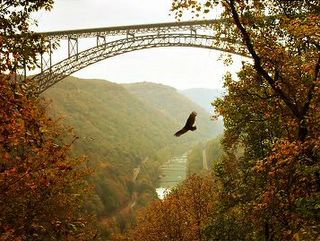It is fascinating to study the commands of the Lord related to remembrance. Over and over again, God commands Israel to remember His good deeds. Why does God command people of faith to remember His past deliverances? It is somewhat mysterious, but we know enough to say that there is something in the nature of human/divine relation which makes it necessary to remember, thank and praise. The psalmists link destruction and sin with a refusal to remember. And likewise, Scripture locates blessings of spiritual health in remembrance.
Today, Memorial Day, my mind went to the great memorial stones set up by Joshua, as the People crossed into the Promised Land. The LORD commanded Joshua to set up an altar of remembrance, and Joshua did just as God said:
Then Joshua called the twelve men whom he had appointed from the children of Israel, one man from every tribe; and Joshua said to them: "Cross over before the ark of the LORD your God into the midst of the Jordan, and each one of you take up a stone on his shoulder, according to the number of the tribes of the children of Israel, "that this may be a sign among you when your children ask in time to come, saying, 'What do these stones mean to you?' "Then you shall answer them that the waters of the Jordan were cut off before the ark of the covenant of the LORD; when it crossed over the Jordan, the waters of the Jordan were cut off. And these stones shall be for a memorial to the children of Israel forever" [Joshua 4:4-7 ].
God is building thanksgiving, remembrance into the life of Israel. One could say that God is teaching Israel a life based on worship. And, in study of Israel's history, it is so clear! When they remembered God, in thanks and worship, praise for His good deeds, they were spiritually and nationally strong. But when they forgot God, they weakened and went into spiritual captivity.
God so built this healthy remembrance into the life of Israel, that they could not participate as faithful believers without remembering. On Passover night, the greatest feast of faith, the entire ritual involved thanksgiving. It confessed great expectation based on past deliverance. The feast was kept with unleavened bread, special benedictions, questioning [usually the son would question the father] and Haggadah response of the father:
Questioning: Why is this night different from all other nights?Haggadah answer [cf. Deut. 26:5-8]: A wandering Aramean was my father, and he went down to Egypt and sojourned there, a stranger and few in number; but there God blessed him to become a great, mighty and populous nation. ‘Yet the Egyptians treated us harshly and afflicted us, and imposed hard labor on us. ‘Then we cried to the LORD, the God of our fathers, and the LORD heard our voice and saw our affliction and our toil and our oppressions and the LORD brought us out of Egypt with a mighty hand and an outstretched arm and with great terror and with signs and wonders…this…this is the night to be remembered!'
- For on all other nights we eat leavened or unleavened bread; tonight we eat only unleavened bread.
- For on every other night we eat all kinds of green vegetables; tonight, only bitter greens.
- For on every other night we eat meat cooked, roasted, or stewed; tonight, only roasted.
- For on every other night we dip once; tonight we dip twice.
Then the first part of the Hallel [Praise] Psalms were sung, followed by the sure third ‘cup of blessing,’ and then a fourth cup with the second part Hallel Psalms, and a blessing over the song.
Wow! What remembrance of faith, to inner health! Now, add to this context the act of Christ taking this feast to himself, as the revelation of the Lamb, the Deliverer, the Messiah...in that 'Last Supper' which would be the last and first of all faith suppers...and we begin to understand just how spiritually powerful remembrance is.
Remembrance locates us in the present presence of God.
Remembrance creates in us the ground for future blessing.
Let's take up the memorial stones, and build an altar for the descended presence of God!
Amen.





